#world without end 1956
Text
On March 25, 1956 World Without End debuted in the United States.
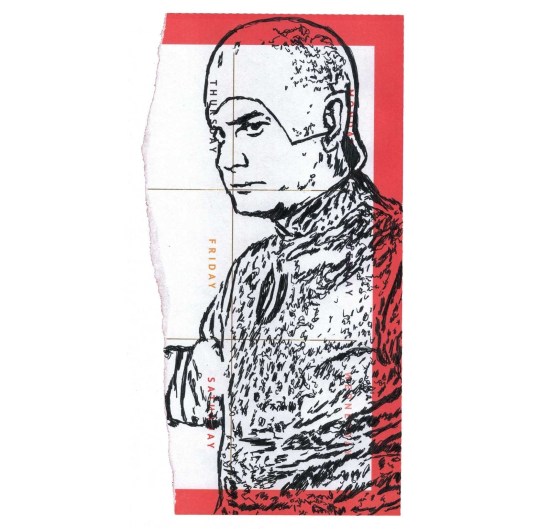

#world without end 1956#world without end#edward bernds#50s science fiction#50s movies#retrofuturism#post apocalyptic film#space adventure film#dystopian science fiction#science fiction art#science fiction film#midnight movie#50s sci fi#monster movie art#monster movies#movie art#art#drawing#movie history#pop art#modern art#pop surrealism#cult movies#portrait#cult film
2 notes
·
View notes
Text
elvis - “you know, if you wanted my attention you didn't have to go to such extremes”

Summary: You are a big Elvis fan, you end up front row at one of his concerts and when it all gets too much, you just so happen to faint…into the kings arms ;)
Pairing: elvis or austin!elvis x reader
Word count: 1087
Warnings: Fluff, fainting/passing out
__________________________________________
It was mid July, 1956, only two weeks passed your 18th birthday and Elvis Presley was doing a concert in your city! You’d begged and begged your mama to let you go, she decided, since 18 was a special birthday, she’d get you a ticket for your birthday, so long as you promised her you’d go with someone.
You managed to squeeze yourself through crowds and crowds of people, fighting your way as politely as possible. You hadn’t gone with a friend because none of your friends really loved him the way you did, and didn’t want to run the risk of being slowed down or held back by anyone. Tonight was your night, your night to dance and sing and scream to your favourite songs in front of your most favourite person, without a care in the world.
When Elvis came out on stage a roar erupted from the crowd behind you, everyone gravitated towards him and you got smushed even harder between the barrier in front of the stage and the people behind you. You couldn’t have cared less, though, absolutely nothing could kill your mood. Elvis got to doing his thing, talking, exciting the crowd, singing of course, talking some more. You were having the absolute time of your life, Elvis was midway through “all shook up” and everybody was going wild in the audience with him. He knelt down at the edge of the stage, scanning his face by the row of people at the front, locking eyes with you for more than a second. You felt like your soul was being released from your body, his gaze just burnt you alive. Your body temperature was steadily rising, nothing unmanageable though, until you noticed your hearing slowly fade, quieter and quieter, until silence. You felt yourself physically weaker, crying at him as he held your jaw softly in one hand. Your vision started to narrow. It kept on narrowing, black nothing taking over the picture in front of you, until you’d completely lost sight. You felt yourself collapse, sort of, there wasn’t exactly enough room to fall but, your body fell as far as it could, as your mind shut down.
Your eyes fluttered open, a cool, damp towel was placed around your neck, you were laid down on a couch, your knees bent up, you assumed to keep the blood flow directed to your brain. Alone, you were, you sat up, perhaps too quickly as your vision started to fade again. You rested your head back down, turning it slightly, peering around the room. A vanity, clothes rack, coffee table by your side, a jacket. You reached for it, laying it over your legs, exploring it.
An initial embroidered on the chest caught your eye, and made your heart drop.
E.P.
“Oh my gosh, no, no.” You mumbled, shooting up, pulling the towel off from around your neck. Of course, the vanity, the clothes, you were in Elvis’ dressing room.
“Everything okay, little girl?” A man you’d never seen before poked his head around the door, asking you.
“Yes, thank you.” You nodded, stuttering slightly.
“You hang tight, E’s finishing up his last song, he’ll be down in a moment.”
E. As in Elvis. Was going to find you in his dressing room. Before you could say anything, he’d left. You just sat there, contemplating running away, anxiously waiting, your heart dropping at the sound of any footsteps passing by the door.
After what felt like hours, you heard that voice you knew all too well. Elvis’, you couldn’t possibly have mistook it for someone else. “Alright, give me a second just gotta check up on something.”
You squeezed your eyes shut, you wanted to give yourself one last chance to wake up from this dream as you heard his voice speak and a pair of footsteps walk into the room you were sat in, only assuming they belonged to said voice. Before he could even begin to say a word, you stood up, insisting you were in his way.
“I’m so sorry, I don’t think I’m meant to be in here, I’ll just—“
“Hey, hey, cool it, sweetheart. Sit back down.” He used his body to block yours from leaving, he had a glass of water in one hand, a wet, dripping towel in the other.
“Uh, Mr. Presley, I appreciate you being so kind but I’m alright, really.” You argued, though obeying his instructions.
"You fainted…straight into my arms. Had me drop the mic and everything for ya. You know, if you wanted my attention you didn't have to go to such extremes." He smiled, sitting down next to you.
“I— I’m sorry.”
“Oh, give me none, only teasing you, sweetheart. Now tell me, what’s your name, honey?” He took the towel you’d had originally away from you, dropping it on the floor, gently draping the new, cold, wet one over your neck. Your hairs all stood on end at the feeling of such temperature, making you shiver. He placed a hand on your chest, slowly pushing you back to lay against his chest, he held the glass of water to your lips, tipping it slightly, encouraging you to take a sip. You did so, pushing his hand away when you’d had enough.
“Y/N.” You spoke.
“Well, Y/N, what happened? Was it the heat? Couldn’t breathe in the crowd? Was it me?”
“What?” You asked.
“Well I’m just curious, honey, what did it to ya?”
“All three, I guess.”
“I’ll take it.” He laughed. “Have you eaten, today, honey?”
You shook your head, with all the excitement about the concert, food wasn’t exactly top priority that day.
“Mm, that’ll do it, too. Make it all four. Would you like to come with us, have dinner? I wouldn’t feel right leavin’ ya in a state like this, not til I know you’re okay.”
“Mr Pres—”
“Elvis.” He corrected you.
“Elvis, I am okay, really.”
“Stand up, do a little spin for me.”
You stood up, quickly, wanting to prove to him you were fine, instead your hand quickly found his knee to prop yourself up as the world had gone black again after standing up too fast.
“Wanna give me a different answer?” He asked, reaching out to hold you as you caught balance.
“Yes, dinner would be wonderful, thank you.” You smiled, raising your eyebrows, regaining your vision.
“Good girl, come on, you stick with me tonight.” He stood up, encouraging you. You knew your parents were going to absolutely kill you when they found out about all of this, but Elvis Presley himself had seemed to take an interest in you, so that was the least of your concerns.
Part 2 (smut) coming soon!
MASTERLIST
#austin butler#austin!elvis x y/n#austin elvis imagine#elvis x reader#elvis#elvis x you#elvis x y/n#austin!elvis x reader#elvis imagine#elvis presley
410 notes
·
View notes
Text

Any real change implies the breakup of the world as one has always known it, the loss of all that gave one an identity, the end of safety. And at such a moment, unable to see and not daring to imagine what the future will now bring forth, one clings to what one knew, or dreamed that one possessed. Yet, it is only when a man is able, without bitterness or self-pity, to surrender a dream he has long cherished or a privilege he has long possessed that he is set free — he has set himself free — for higher dreams, for greater privileges.
—James Baldwin, "Faulkner and Desegregation," Partisan Review (Fall 1956)
[Robert Scott Horton]
110 notes
·
View notes
Text

WORLD WITHOUT END (1956) and the INDESTRUCTIBLE MAN (1956)
13 notes
·
View notes
Text
Gerhard Barkhorn timeline

This is Gerhard Barkhorn, the second greatest flying ace in history, timeline:
1919: He was born in Königsberg
1937: He joined the Luftwaffe.
1938: He started his pilot training.
1939: The Second World War began.
1940: He was moved to the 6th squadron of the 2nd group of the 52nd fighter wing (6./II.JG 52) to participate in the Battle of Britain, without achieving any victory and instead being shot down twice.
1941: JG 52 was transferred to the east and participated in Operation Barbarossa.
1941: He scored his first victory
1941: He was promoted to Oberleutnant.
1942: He was appointed Staffelkapitän (squadron leader) of 4./JG 52.
1942: He received the Ritterkreuz for having shot down a total of 59 aircraft.
1942: He received the Luftwaffe honor cup.
1943: He was awarded Oak Leaves to his Knight's Cross.
1943: He was appointed Gruppenkommandeur of II./JG 52.
1943: He reached the 200 mark on 30 November.
1944: He was awarded the Swords to his Knight's Cross.
1944: He attended the wedding of fellow ace Erich Hartmann as best man
1944: He was promoted to major.
1945: He scored his 301st (and final) victory.
1945: He was assigned as Geschwaderkommodore to Jagdgeschwader 6 (JG 6), a unit assigned to defend the Reich.
1945: The Second World War ended.
1956: He joined the Bundesluftwaffe, rose to command JaboG 31 Boelcke.
1983: On 6 January , during a winter storm on an autobahn near Cologne, he and his wife Christl were involved in a car accident; his wife died instantly and Barkhorn died in hospital on 8 January . They were buried in Tegernsee, Bavaria.
Sources:
Wikipedia: Gerhard Barkhorn
Military Wiki: Gerhard Barkhorn
❗❗I DON'T SUPPORT NAZISM,FASCISM OR ZIONISM IN ANY WAY, THIS IS AN EDUCATIONAL POST❗❗
33 notes
·
View notes
Text
by James Wile | Aug 27, 2024
Condoleezza Rice recently wrote an article entitled “The Perils of Isolationism” in Foreign Affairs giving her thoughts on the United States’ place in the modern world. As the title implies, the article’s main theme is her fear that the United States will abandon its role as the global hegemon and turn inward. She claims a return to isolationism will result in Russia, China, and other tyrannical governments overrunning the world and oppressing its inhabitants.
Theoretically, this article should present a convincing argument. Rice served as national security advisor and secretary of state under George W. Bush, so she should be a foreign policy expert. Unfortunately, the biggest takeaway from the article is that Rice learned nothing from the failures of the Bush administration. She presents her case for more interventionism without meaningfully addressing the undeniable devastation caused by U.S. interventionist policies. The result is an article that reads like a fairy tale meant to comfort readers who wish to remain blissfully removed from reality.
Few passages demonstrate this lack of self-awareness more than Rice’s appraisal of U.S. involvement in the Middle East. When describing the benefits of the post-World War II global order, Rice displays what can only be described as denialism by writing, “As the United Kingdom and France stepped back from the Middle East after the 1956 Suez crisis, the United States became the guarantor of freedom of navigation in the region and, in time, its major stabilizing force.”
It is disturbing that any member of the Bush administration could describe the U.S. as a “major stabilizing force” in the Middle East. Decades of the American “stabilizing” the Middle East led to 9/11, the worst terrorist attack in our nation’s history. The Bush administration’s answer to this attack was not to focus on bringing the attackers to justice but rather to topple the governments of Afghanistan and Iraq. The United States paid a hellish price in money and lives in a vain attempt to spread democracy, but the result was a less stable Middle East. The Barack Obama administration expanded the destabilization by bombing and blockading even more countries despite his campaign promise to end forever wars.
Rice seems to hope her readers are willing to forget or ignore these foreign policy disasters. I can think of no other reason she would expect anyone to believe the U.S. has been a “stabilizing force” in the Middle East. The U.S. has stabilized the Middle East about as well as ten shots of Tequila would stabilize the decision-making skills of a college freshman.
5 notes
·
View notes
Text
Redoing the Intro One More Time!
Updated 9/30/23
Call me Moshke Palmoni (they/them). I spend as much time as I can writing, but that is not as much as it might be because there's also a lot of life going on right now. I also like to read, knit, collect vintage ephemera, and play with my cat.
General WIP tag list: [your url here!]
Active WIPs:
7 Days for Fae
Coming October 2024
10-year-old Fae is isolated by her disabilities—autism and ataxia—that causes her communication and mobility issues. She doesn’t have any friends her age, and she’s accepted that. She reads a lot and plays pretend in the forest at the end of the street. Her family loves her for who she is and so far that’s been enough. Until, that is, she meets the new kid. His name is Brownie and for reasons Fae can’t imagine he wants to be her friend no matter how weird or awkward she is. When he still invites her over after a meltdown in class gets her suspended for a week, she decides to take a risk and accept. The ensuing adventures are marred only by the other sudden change in her life—an aunt Fae barely knows has moved in with her family. She doesn’t know how to talk to Fae and, worse, refuses to accept Fae’s nonbinary parent’s identity. But since no one else seems to know how to deal with the mess their home life has become, Fae tries—with Brownie’s encouragement—to sort the situation out herself.
Cold Iron
In 1956, Shakatra Zoawin is 40. Or they might be 20, depending on how you look at it. They are a changeling and their aging is kind of weird, but that doesn't matter to them because they have a good life in the subway tunnel with their brother, Kris. Both of them are changelings swapped as infants for human children and then rejected by their human families. Their wits and powerful magic have kept them alive this long, and Shaka is perfectly content to keep going. After they do one little thing to appease their guilt: find the 40-year-old they were swapped for and free her to have her own life in the human world free from servitude in the courts of the Fae. And so begins an adventure that will have repercussions neither of them could have imagined.
Intro posts for the books in this series: Cold Iron, City of Frost, Song on Repeat, and Future Not Found
Character Intro Posts: Shakatra, Kris, Lynn, Tatiana, Liliana, Harry, Doug, Beth, Aaron, Cassie, and Althea
Tag list: @pga-books
Blades of Ice
In the kingdom of Halara, orcs and elms and slimes and centaurs live peacefully side-by-side with humans. Less peaceful is the relationship between Halara and their neighboring kingdom of Eng. The generation-long conflict has drawn in other nearby kingdoms and stagnated artistic and social works. All Aryel ever wanted to do was be left alone to love who they want and practice sparring with their axe, but as a royal child they have responsibilities, namely leading the entire army. There's no talk of ending the war in any way but victory, just as Halara won its initial freedom from Eng 300 years ago, but this endless fighting is getting them nowhere but too many funerals and not enough bread. And then when a familial tragedy leads to Aryel leading both the army and the kingdom, they know they can't balance the tensions and demands of everyone at once and win this war. Something has to give, and they just hope it isn't the entire kingdom.
Backburnered and still-in-planning WIPs under the cut.
Time Traveling Anthropologists
(permanent title coming soon)
Set approximately 2 generations in the future. Esther Dahan has her dream job. She gets to time travel with her new team, and against all historical odds they are there to study ancient cultures rather than do anything violent. Their first assignment is 8 months in the 9th century Jewish kingdom of Khazaria. Everything is going great—illicit romance with a Khazarian blacksmith notwithstanding—until Esther finds a plate that doesn't belong in this time. Curious and suspicious but without enough evidence to involve her boss, she investigates on her own, discovering much more than she planned—and leading to far worse consequences than she could have imagined.
Tag list: @amielbjacobs @kingkendrick7 @moonluringfrost @another-white-hole
To Die Among the Stars:
20 people have been chosen to test the effects of faster-than-light space travel on human minds and bodies. They were taken from prisons, wellness centers, and other areas where near-certain death seemed like a reasonable chance to take. Each have their reasons for being there, and their secrets. Against all odds, the jump to FTL doesn't destroy the ship. But the further away from Earth they travel, the more strange things begin to happen that call the purpose of the experiment into question. And then the impossible: a human distress signal in deep space.
Told from 4 rotating perspectives: Pixel, a semiverbal illegal human modder; Ri, whose body and mind are overloaded with mods; Zippy, a young disabled woman desperate to support her family; and Peppermint, a genetic experiment combining human and cat DNA raised in an isolated lab.
Tag list: @hd-literature
Falling Petals
A multigenerational story about trauma, love, and disability set against the backdrop of one Jewish family. Beginning in the 1920's with Ira Katz, who is brilliant and charming with no understanding at all of tact or why the best way isn't always blunt observations and mean jokes. It follows him as he grows up, marries, and inherits his father's drugstore, and then moves on to following one of his sons, Daniel. Daniel grows up in the 1940's and is naturally gentle, kind, and sensitive, but is treated so harshly for these traits he learns to hide himself away inside and only show emotion in explosive bouts of anger. It follows him through adolescence, college, and marriage, before moving on to one of his daughters, Shoshana. Shoshana grows up in the 1960's and is colorful, young for her age, and full of social panic. None of them know how to relate to each other or survive in a world that each of them see the beauty in but aren't allowed to connect with in their own way. And yet through the pain and confusion, they are full of love. And then everything changes for them with Shoshana's niece, Naomi, growing up in the 1990's, who will not be allowed to see herself as broken.
39 notes
·
View notes
Text
What's in a name?

I'm not sure I've ever publicly shared how/why Audrey was named Audrey. Years ago, in an author's note on FFN, I shared why her mother was named Elizabeth Julia Andrews nee Wells.
"Audrey's mother's name, place of birth, and birthday (October 1) are in honor of my favorite actress, Julie Andrews. Dame Julie's birthname was Julia Elizabeth Wells (Audrey's mum is Elizabeth Julia Wells). Her (Julie Andrews) parents divorced when she was young and she took her stepfather's last name, Andrews. Her pen name is Julie Edwards (Her husband is director Blake Edwards)."
In the Return, Jon and Audrey's oldest daughter is named for her grandmother, bringing the name back to Julia Elizabeth.
As for Audrey, she was also a tribute to Julie Andrews and another actress during the same time who left an indelible mark on Hollywood- Audrey Hepburn.
How is naming Audrey after Audrey Hepburn a tribute to Julie Andrews? Julie Andrews originated the role of Eliza Dolittle in the Broadway version of "My Fair Lady" (1956). Audrey Hepburn took over the role for the film version (1964). This was a bit controversial at the time as Andrews was considered the perfect Eliza and Hepburn's singing voice had to be dubbed. However, Julie had no screen experience and Audrey was an established star. It all worked out in the end as "Mary Poppins" followed closely by "The Sound of Music" established Julie's on-screen presence and stardom for all time.
The meaning of the name Audrey also suits my girl to a T:

As for Audrey Hepburn, she is an incredibly interesting person separate from her acting career.
Favorite quotes from Audrey Hepburn that Audrey Andrews has posted on her walls somewhere:
"I believe in pink. I believe that laughing is the best calorie burner. I believe in kissing, kissing a lot. I believe in being strong when everything seems to be going wrong. I believe that happy girls are the prettiest girls. I believe that tomorrow is another day and I believe in miracles."

"I decided, very early on, just to accept life unconditionally; I never expected it to do anything special for me, yet I seemed to accomplish far more than I had ever hoped. Most of the time it just happened to me without my ever seeking it."

"For beautiful eyes, look for the good in others; for beautiful lips, speak only words of kindness; and for poise, walk with the knowledge that you are never alone."

"True friends are families which you can select."

"There are more important things than outward appearance. No amount of makeup can cover an ugly personality."

"Living is like tearing through a museum. Not until later do you really start absorbing what you saw, thinking about it, looking it up in a book, and remembering because you can't take it in all at once."

"If my world were to cave in tomorrow, I would look back on all the pleasures, excitements and worthwhilenesses I have been lucky enough to have had. Not the sadness, not my miscarriages or my father leaving home, but the joy of everything else. It will have been enough."

“They say love is the best investment; the more you give, the more you get in return.”

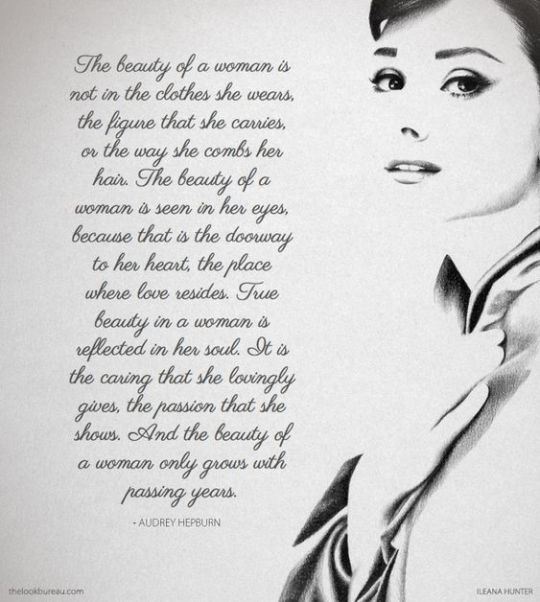
#julie andrews#julia turner#audrey hepburn#Audrey Andrews#oc character#ocappreciation#oc art#digital drawing#quotes#autumn in philadelphia#fanfiction#boy meets world fanfiction
12 notes
·
View notes
Text
For black history month, I’d like to shed some light on some of my favorite queer people of color. 🏳️⚧️🏳️🌈💗
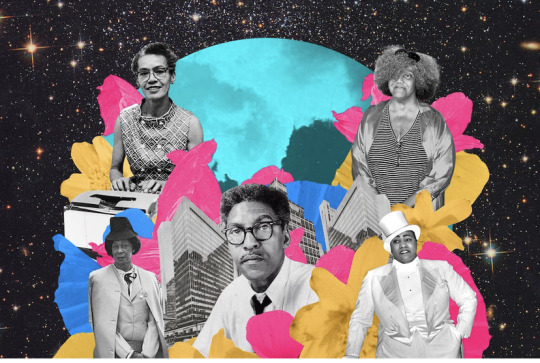
1). MARSHA. P JOHNSON ✨
Marsha. P Johnson was an American drag queen born August 24th 1945. Johnson was known for being a prolific queer and trans right advocate. She was also apart of the stone wall riots which sent of a wave of LGBTQ rights and protests. A quote by her:
“Darling, I want my gay rights now. I think it’s about time the gay brothers and sisters got their rights… especially the women.”

2). LUCY HICKS ANDERSON.
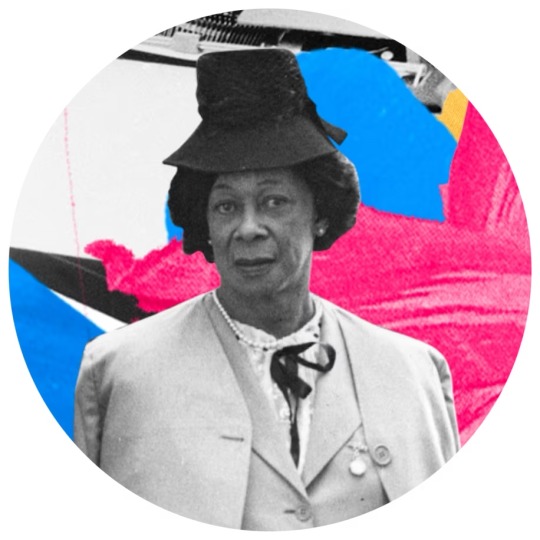
Lucy Hicks Anderson was a transgender pioneer for marriage equality. She was known as Americas first ever prominent trans women. Lucy was married to her husband, and paved the way for marriage equality. A quote by her:
“I defy any doctor in the world to prove that I am a woman.”
3). BAYARD RUSTIN.
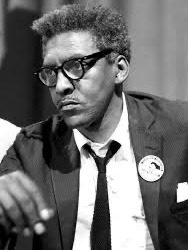
Bayard Rustin was a gay civil rights activist. He is heavily recognized as being a key part in the civil rights movement. He was a prominent gay man during the civil rights movement when there was no space to talk about lesbian and gay issues. A quote by him:
“If we desire a society of peace, then we cannot achieve such a society through violence. If we desire a society without discrimination, then we must not discriminate against anyone in the process of building this society. If we desire a society that is democratic, then democracy must become a means as well as an end.”
4). AUDRE LORDE
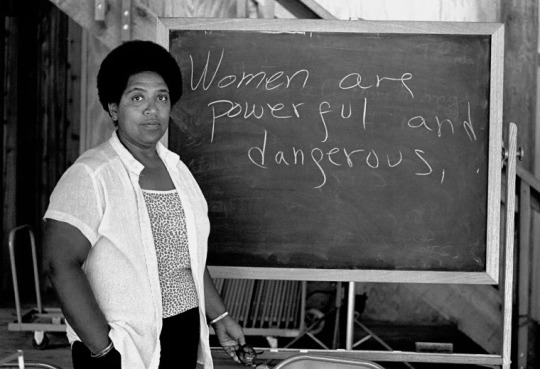
Audre Lorde was a lesbian poet. Who made lasting contributions to feminist activism and history. Being known as a fierce advocate for queer, black, and women’s rights. Among her most notable works are “Coal” (1976), “The Black Unicorn” (1978), “The Cancer Journals” (1980) and “Zami: A New Spelling of My Name” (1982). A quote from her:
“I write for those women who do not speak, for those who do not have a voice because they were so terrified, because we are taught to respect fear more than ourselves.”
5). JAMES BALDWIN
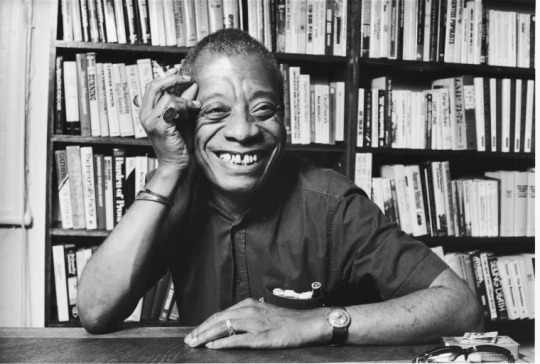
James Baldwin was a American writer and social critic. He is perhaps best known for his 1955 collection of essays, "Notes of a Native Son," and his groundbreaking 1956 novel, "Giovanni's Room," which depicts themes of homosexuality and bisexuality. Which broke social norms and showed that queer people had a place in the books they read. James spent most of his career educating people on black culture and history. And taught more people about homosexuality in a good light. A quote by him:
“Everybody’s journey is individual. If you fall in love with a boy, you fall in love with a boy. The fact that many Americans consider it a disease says more about them than it does about homosexuality.”
————————
Thank you to everyone who read this all the way through! I can’t donate money to organizations but try to do the best I can. We need to start recognizing the wonderful things that have come from the black queer community. 🏳️⚧️🏳️🌈💗I hope I can do a little bit to positively help.
#queer#lgbtq community#lgbtq#educate yourself#activism#bisexual#black culture#queer poc#black history month
13 notes
·
View notes
Text
Starship troopers is (Not) Satire
Starship troopers is a 1997 satirical re-interpretation of the 1956 Sci-fi novel by Robert A. Heinlein, which went on to inspire the 2015 Satirical top down shooter Helldivers by Arrowhead Game Studios and later the 2024 Satirical sequel game Helldivers 2, by the same studio.
But everyone knows this..., or do they? During the popularity of Helldivers 2 there was a large spike in people and players who didn't realize that the game was a comedic and satirical commentary on fascist governments. Even some close friends whom I played the game with didn't know this was the case and as the discussion went on there were people saying they didn't know or think Starship Troopers, the games very clear inspiration was also a satire.
And there were many people throwing around accusations or poking fun at people for not knowing this, but I feel like there was and still is an important discussion to be had around this, why didn't people know this? IT'S SO OBVIOUS RIGHT?
Well..., no, when Starship Troopers initially came out many movie goers didn't see it as satirical, some people even thought the film was pro-Fascist and pro-nazi. And later sequels would tone down the satirical angle of the films.
When I was younger I assumed the movie was just another sci-fi American war film about brotherhood and defying the odds, it wasn't until I was told of the films satirical nature did I stop and look for it.., so what went wrong?

I believe both the issue with the film and the video game is the framing of it. In the example of Starship trooper...
The movie is about Rico, a young student who wants to join the military because of a girl he likes despite the wishes of his parents who want him to go onto higher education. Sadly the girl he threw his life away for breaks up with him, so he puts himself completely into becoming a great soldier.
And he's really good at it, until his strive to achieve ends tragically when he gets one of his friends killed and is punished for it. Demotivated and blaming himself he wishes to leave, only for the bugs to launch a meteorite at earth, killing his family. Motivating him to return to service and fight.
The initial assault on the bug home-world is absolute failure and a slaughter, but Rico manages to survive and we learn in a shocking twist that the bugs are a lot smarter than we gave them credit for.
Responding to a distress call, we learn the existence of a brain bug, that is able to drain the brains of humans to gain information about us. We've learned where one of these brain bugs might be and we push for an assault on the planet.
Rico lands, saves the girl of his dreams and the army is able to capture a brain bug, learning that for the first time that they are now scared of us and the chance to win the war is growing closer, happy ending.
Now, many people will read that and think, wait no, your missing out key details or important observations. Well, what I told you is probably what most movie goers would of probably picked up on when watching the movie. The important satirical and anti-fascist details we are familiar with are essentially, background noise. They are very small scenes.
Example, the needing the citizen ship to be able to have a kid detail? That is in one scene, it lasts for about a few seconds and isn't expanded upon. We were suppose to take away from it that the government is controlling who and who can't have a kid and enrolling into the military is essentially indoctrination, however, without more context there isn't much else to go on.
The fact that the whole war is started by the humans first by invading the bugs territory? Again, it's a really small scene and we don't know what exactly invasion means in the grand scheme of things, but through out the movie we have ONLY seen the bug be the aggressors and the manner in which they aggress is incredibly violent, cruel, painful and indiscriminate.
Casper Vein Dien, the actor for Rico, asked the director, Paul Verhoeven if the satire was a bit too heavy handed, with the director saying that the satire was 'subtle'. To which after seeing the reaction with most people missing the point of the movie, agreed that maybe they made the film, too subtle.
And I agree, but I don't think it's the only problem. Helldivers 2 is WAY less subtle with it's broadcasts and use of propaganda. With videos and images of robots stealing baby prams.
However, most of the fanbase, who are in on the joke have responded with Pro-propaganda and in doing so, many people take the game as a pro-war game.
After all, you are fighting against mindless bugs and machines who attack you on sight, slaughter workers and stuff them into cages. Your just taking back your worlds from these invaders, right?

By framing both media as the 'hero', having you defend and fight against these attackers. you convey to the audience that you are in the right, especially when you compare how much damage the enemy do compared to yourself. There is no scenes of squashing sympathies, rebellions, or seeing what life is like for the average non-citizen, we get to see the world from the 'privileged', the rewarded, the heralded.
The characters we are typically seeing doing right, but we aren't seeing them doing wrong. The context is there, but it can be missed by an average viewer and the fact it can be missed is a problem as it paints the setting as one of pro-war propaganda and doing what is right for the people.
Like I said, if you aren't looking for it, you don't see it.
#helldivers 2#Helldivers#Starship Troopers#Satire#Propoganda#critical thinking#anaylsis#media analysis
4 notes
·
View notes
Text
On December 10, 1994 World Without End debuted in Germany television.

#world without end#world without end 1956#science fiction#sci fi movies#sci fi#retrofuturism#pen drawng#pen art#movie art#art#drawing#movie history#pop art#modern art#pop surrealism#cult movies#portrait#cult film
1 note
·
View note
Text
ANTHONY PERKINS
ANTHONY PERKINS
1932-1992
Anthony Perkins was an American actor who is best known for playing Norman Bates in Psycho (1960). He worked as an actor on both stage and screen. Perkins appeared in: Friendly Persuasion (1956), On the Beach (1959), Psycho (1960), Murder on the Orient Express (1974), Les Miserables (1978), The Sins of Dorian Gray (1983), and Napoleon and Josephine: A Love Story (1987).
Perkins was born in Manhattan, New York, US and was the son of an actor. His descendants were passengers on the Mayflower ship. He spent little time with his father and grew up around females and was sexually assaulted by his mother. His mother moved to Boston and worked in the theatre which Perkins gained an interest in. During school he appeared in numerous plays and then moved to California to pursue his acting career.
Perkins pursued the lead role in East of Eden and Rebel Without a Cause; both roles went to James Dean. Hitchcock cast Perkins in Psycho after watching him in Friendly Persuasion. It was made on a low budget with Perkins and Leigh accepting low salaries. The film was a success and Perkins became internationally famous. At the end of his life he was to be a voice actor for a dentist character in The Simpsons, however died before his part was recorded.
Perkins was married and had two children. In 1973, Perkins married Berry Berenson and they had two children together. They were still married when Perkins died of AIDS in 1992. Berenson, 53, died on 11 September 2001 as one of the passengers on American Airlines Flight 11. The plane was hijacked by Islamic terrorists and was crashed into the North Tower of the World Trade Center (the second tower to be hit).
Perkins started experimenting sexually with men during college and his homosexuality continued throughout his life. He went to therapy in 1971 after he and his male partner believed their homosexuality was obstructing their happiness and wanted to restart their lives with women and Perkins later stated that he wanted that period of his life over with ‘I just didn’t want it anymore.’ It is disputed whether Hopkins was homosexual or bi, in 1983 he stated that it was his mother’s sexual abuse that had something to do with it which led him to ‘being unable to see a beautiful woman.’ Perkins had same-sex relationships throughout his adult life, some of these relationships were long term.
Perkins supported causes such as civil rights and feminism and stated that men should take on ‘motherly’ roles and stated that he changed diapers and fed his children. He was a volunteer at an organization which delivered meals to HIV and AIDs patients (before he was diagnosed with AIDs). Perkins mother was strictly religious, however; Perkins called himself an atheist.
During filming Psycho IV: The Beginning, he was tested for HIV and died at his LA home on 12 September 1992 from AIDs related pneumonia, aged 60.
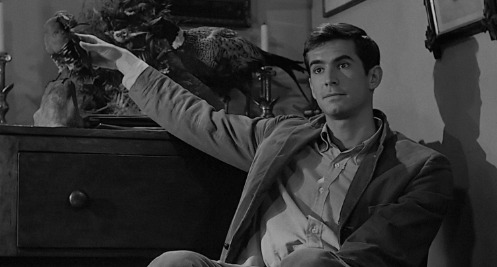
#anthonyperkins
8 notes
·
View notes
Text
Okay so here’s a bit of analysis about The Guy Who Didn’t Like Musicals. I’ve seen a lot of people analyze this musical without the context of any invasion of the body-snatchers. And I get that! I haven’t read the original book, but I have seen the 1956 and 1978 movie versions. I feel like the context those films give us is a VERY interesting lens to view the musical through.
Now, the 1956 version of the movie came during the Red Scare and you can really tell. The novel that it’s based off of was apparently serialized starting in 1952. As I said earlier, I haven’t read the book, but what I found on wikipedia makes it seem like the book’s critiques were based more on colonialism and environmental collapse. One of the alien criticisms is “humans are destroying the world anyway so why should it matter that aliens are doing it now?” Despite these things, it had an optimistic ending where the aliens decided that it wasn’t worth trying to take over the earth and left! I can tell from what I found that it established these consistent bits that the others kept going forward, despite focusing on different themes/fears
The aliens create duplicates
The duplicates are grown from seed-pods and the original person disappears forever
The duplicates retain their memories but are unable to experience human emotions
However, the 1956 version is what I think really shapes the way that the story is presented in pop culture. It
1. Gives us the phrase “pod people” and brings in the Red Scare and fear of communism/invasive ideologies/the world around you changing so fast without you noticing and then it taking you over too.
2. This version has another “hopeful” ending, where the main character DOES get out of the town and the authorities take his story seriously.
3. We see intricate systems for how the duplicates disguise themselves and propagate their species
4. The early building of the horror relies on something being Not Quite Right with the people and playing into the idea of Female Hysteria, especially with the male main character being a Doctor in the American Fifties
5. The Red Scare Propaganda splattered all over it can make it hard for viewers like me not to. Kinda root for the aliens.
6. Introduces (to me, at least) the premise that the main characters are going to be a heterosexual pair, the woman is turned first, and then the duplicate! woman tries to turn the man.
The 1978 version brings a few new bits to the mythos
The aliens have a distinctive noise that they use to communicate with each other. Humans CAN’T make it, so it’s an easy give away that this is no longer a person, even if they’re doing a good job of acting like one
This one establishes more environmental worldbuilding. It shows the plants springing up all over the city, sees them being given as gifts, sees teachers encouraging very young students to pick them, etc.
It continues with the heterosexual pair with the man outliving the woman as a human
This is the first version that I remember doing a really good job with the “pretending to be a duplicate” idea
The ending, up until the last shot, is very ambiguous. While San Francisco, the city that started the outbreak, has clearly been overrun by the duplicates, we aren’t sure how much of the outside world has been. We are, however, sure that one character has been blending in with the duplicates. Then, the ending… it was ambiguous until it wasn’t and hope lives between the lines. Then it dies when the lines come together like a garrote.
Now, how do these things come together to influence a reading of The Guy Who Didn’t Like Musicals?
The subtle horror in the beginning of the musical, through BOTH relationships and environmental storytelling.
The different versions create conflicting expectations, which are sometimes adhered to and sometimes subverted. (Which is very interesting when viewed within the There Are Multiple Musicals In the Hatchetfield Timeline With Very Different Plots But the Same Characters) thing
The creativity with the visuals and process of the transformation. There’s always been an emptiness in the portrayal of pod-people, and the 1978 version adds the Weird Noise, but this adds the layers of 1. It’s very obvious who’s been possessed in a way that it normally isn’t 2. The process is almost divorced from the plant 3. It is not only instantaneous, but it isn’t making a “copy” of the body. It’s taking the body OVER. full zombie style. That is…. Really fucking creepy
Since there are different versions of the story it’s riffing on, for people who know the material it’s riffing on, it leaves us with the question of which one it’s going to emulate and how? Or is it even going to DO that? The answer is all of them and none of them.
If the 1956 version is a commentary on the fear of communism, then The Guy Who Didn’t Like Musicals is a fear of toxic positivity, conformity, the customer service persona, and the failings of American capitalism. The demands for Emma to sing at work, even before her boss got possessed? The particular demands on Paul and his coworkers at their company, including a company softball league?
They still play with plant imagery, though. Emma’s weed farm? Alien! Alice singing a whole song about not being her dad’s “seed”. Of course there’s the weird sexual layers with the Biblical use of seed to mean descendants and the use of seed to mean semen, but it STILL harkens back to the seed pods in the original.
This idea that people need to “want” something specific and tangible but it always, always ended up just being… their loved ones. Sure, those relationships were tumultuous and difficult to deal with, but there was still a spark to them that was absent once they were apothesized. It’s very hell both IS other people and the lack of other people. I feel like this delved into character relationships and how motivation can be weird and messy a lot more deeply than the others, and it was a refreshing change of pace.
The 1956 version is set in a small town that made it feel small and containable and the 1978 version is set in a city where we see LOTS of people that makes it both feel way bigger and way… less real. I liked the balance this struck with it being a large city but even with the double casting, there still only being so many connected relationships and showing exactly how everyone ended up apothesized.
The use of the a highly connected island city actually did a great job of bringing together the best of both worlds here: the isolation and connection AND the hopelessness and scope. (look the narration called Hatchetville a tiny town but tiny towns don’t have at least 2 high schools.)
Of course, this combination of it being both large and isolated is crucial to the BEST thing that the musical does in conversation with the two most well-known version- the bait-and-switch. If you’re aware of both endings, tgwdl does a very good job of making you think they’re pulling the happier ending. While it’s not the exact same setup (clearly still human character claws their way to an uninfected area and convinces someone that they have to do something) it’s close enough that it would have felt like a hopeful homage to that first one. Survivor in a hospital, being treated? Yeah! The bomb thing worked? GREAT! But then it pulls off the twist ending of the 1978 version, where the still human character desperately tries to talk to someone dear to them because surely, surely they’re still human, neither the character nor the audience has seen evidence to the contrary. They’re acting almost the same as they did Before ™, and that makes the ending such a gut punch. The combination of “there was a hopeful ending in the first one” and the great build up, it just works so well to tear that out of our grip in the last few horrifying and tragic moments. (It took my roommate quite a long time through the end for her to believe that Paul WASN’T faking)
The gender swap of the final confrontation is just… it’s a great touch. While of course it was going to go that way from a writing standpoint because it being Emma first would have been FAR less interesting, it also forces us to confront the horror of the situation FROM the female character’s perspective, something that has been sorely lacking in the movies. Sure, no one wants to be the last one left human in a situation like this, but the love interests getting turned was never the heartbreak and terror that it was with Paul.
Part of that is because 1. Paul is the “star of the show” 2. There is a whole POSSE backing him up as opposed to the other movies where it’s just the love interest but it’s also 3. The terror of it being gendered violence, especially with a tall man and a short woman. Paul might be the “star of the show” and his transformation was also terrifying, but it’s so…. Visceral with Emma. So often with violence done to female characters it’s… thoughtless? Less about the terrible thing being done to THEM than the thing as motivation for another character. Sure, there’s a terror to their death, but especially in those invasion of the bodysnatchers movies, it’s less about what’s happening to the female character being a tragedy and more about how that endangers their male love interest, who’s the real main character. But this gives us so very much horror for both of our main characters….. And it never treats Emma or her own experiences and terror as an after thought. Emma being forcibly turned in such awful, sexual-assaulty circumstances is treated as the awful violation that it is, and that gives us a situation where we can see the horror for everyone involved, without even having to think about the world. Which is also doomed.
This gendered violence element of this version extends through the curtain call, while Emma begs the audience for help before she’s dragged away. It feels so viscerally familiar, and honestly, I’m not sure I wouldn’t do something to try to help. It feels like we, the audience, are being made complicit in this. While it IS a work of fiction that we are just watching, it would be SO hard not to remind myself that this is actually a production being staged. I’m the person who has accidentally attacked haunted house employees. I may not have been able to stop myself from doing something. I hope I would have! But I also am not sure about that.
11 notes
·
View notes
Photo
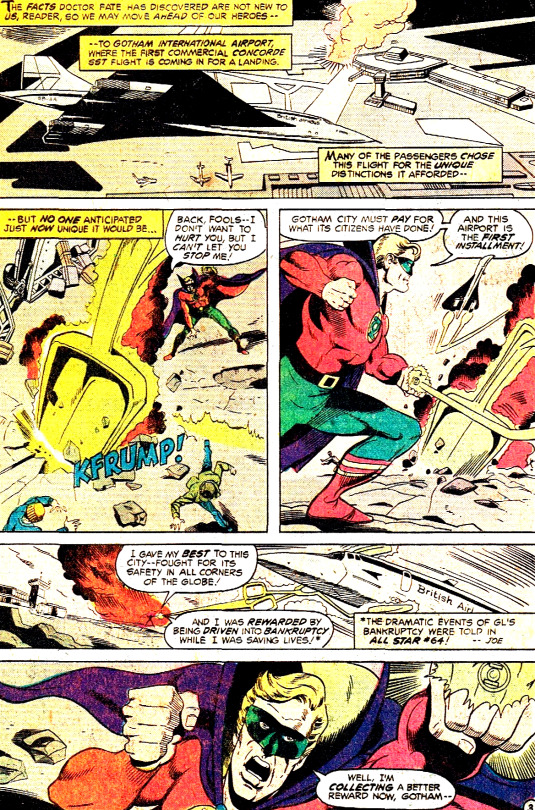

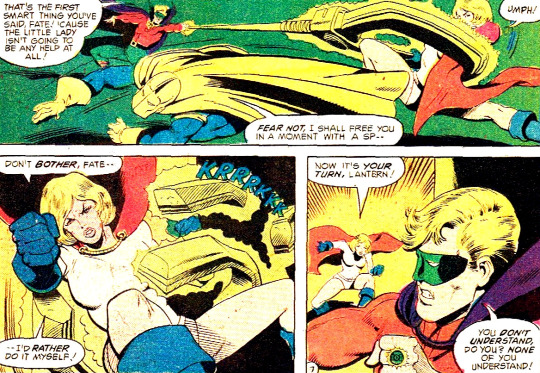
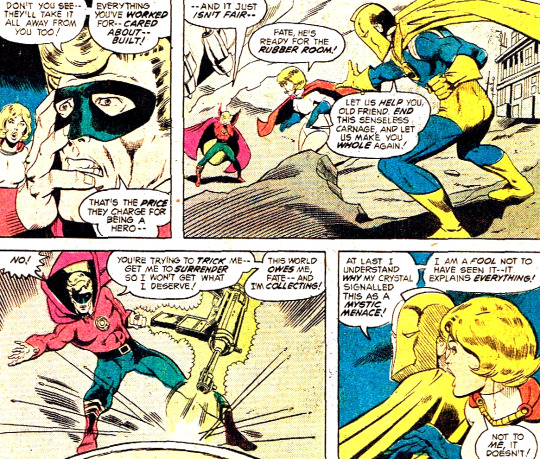
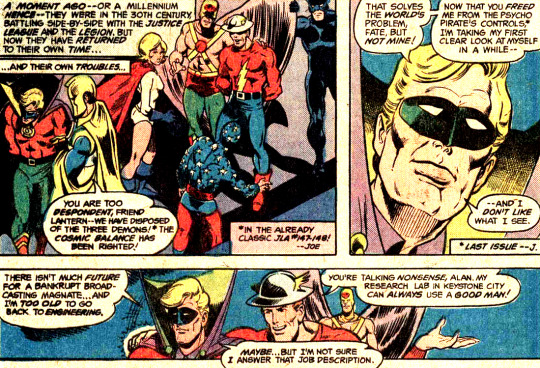
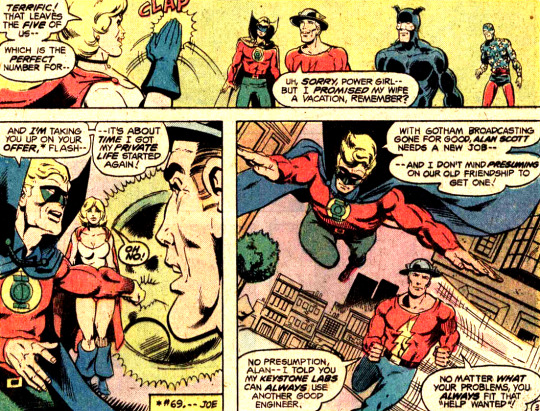

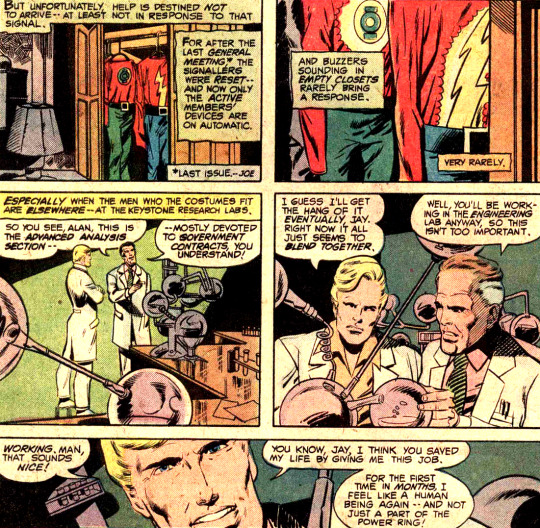

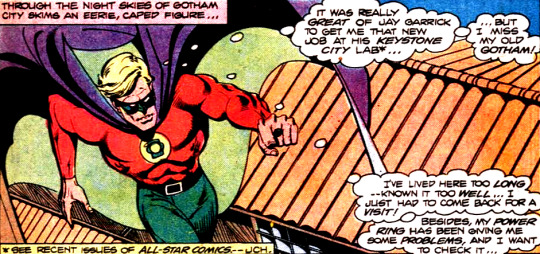
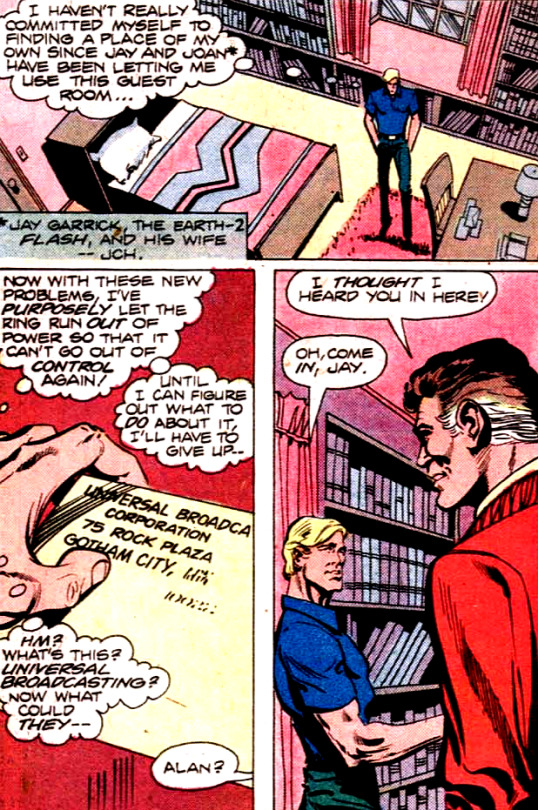
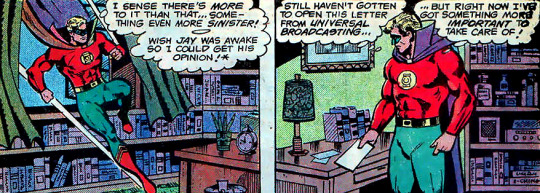
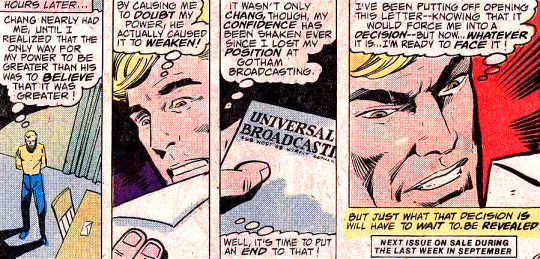
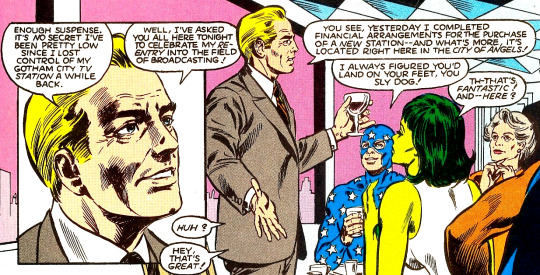
Alan Scott’s various breakdowns are by now relatively common knowledge in fan spaces but lately I’ve been reading a lot about one of my favourite JSA eras, their revival in All-Star Comics (1976), and I realised something that’s often forgotten is the fact that the consequences of what I’ve colloquially referred to as ‘the airport incident’ followed Alan around for very nearly a decade.
After GBC went bankrupt, Alan -- encouraged by the Psycho Pirate -- took his frustration out on the Gotham International Airport and landed himself & the JSA in some major trouble with the law (March 1978). After the loss of his livelihood, he proceeded to live in Jay Garrick’s guest room for almost a year until he was offered a job with Universal Broadcasting (November 1978). It would be another seven years until he’d run a broadcasting station again (December 1985), initially in LA and then once again in Gotham (of course, not without a couple other mishaps and rampages along the way, but that’s another story).
Here, I offer a quick illustrated history of that period.
I gave my best to this city -- fought for its safety in all corners of the globe! And I was rewarded by being driven into bankruptcy while I was saving lives! // You don’t understand, do you? None of you understand! Don’t you see -- they’ll take it all away from you too! Everything you’ve worked for -- cared about -- built! That’s the price they charge for being a hero-- and it just isn’t fair! || All-Star Comics (1976) #68
That solves the world’s problem, Fate, but not mine! Now that you freed me from the Psycho Pirate’s controls, I’m taking my first clear look at myself in a while -- and I don’t like what I see. There isn’t much future for a bankrupt broadcasting magnate... and I’m too old to go back to engineering. || All-Star Comics (1976) #69
With Gotham Broadcasting gone for good, Alan Scott needs a new job-- and I don’t mind presuming on our old friendship to get one! // I’m through forgetting about my life! From now on, Green Lantern is taking a backseat to Alan Scott’s happiness! || All-Star Comics (1976) #70
You know, Jay, I think you saved my life by giving me this job. For the first time in months, I feel like a human being again -- and not just a part of the power ring! || All-Star Comics (1976) #71
There he is... outside his prestigious research laboratory. And the man with him bears an extraordinary resemblance to Green Lantern! || Showcase (1956) #98
It was really great of Jay Garrick to get me that new job at his Keystone City lab... but I miss my old Gotham! I’ve lived here too long-- know it too well... I just had to come back for a visit! // I haven’t really committed myself to finding a place of my own since Jay and Joan have been letting me use this guest room... || Green Lantern (1960) #108
Still haven’t gotten to open this letter from Universal Broadcasting... || Green Lantern (1960) #109
My confidence has been shaken since I lost my position at Gotham Broadcasting. Well, it’s time to put an end to that! I’ve been putting off opening this letter... knowing that it would force me into a decision-- but now... whatever it is... I’m ready to face it! || Green Lantern (1960) #110
Enough suspense, it’s no secret I’ve been pretty low since I lost control of my Gotham City TV station a while back. Well, I’ve asked you all here tonight to celebrate my re-entry into the field of broadcasting! You see, yesterday I completed financial arrangements for the purchase of a new station -- and what’s more, it’s located right here in the City of Angels! || Infinity Inc. (1984) Annual #1
#jsa#justice society of america#justice society#alan scott#green lantern#jay garrick#the flash#kent nelson#doctor fate#karen starr#power girl#henry king sr#brainwave#jennifer lynn hayden#dc jade#dc#dc comics#u#u can reblog#i realise this is pretty likely written for a target audience of me but i thought itd be pretty neat to have it all in one place#and of course im personally obsessed with every part of alans history and its evolution and how easily it can be tracked#and more so i miss when superheroes had real lives and the private self the /real/ self wasnt effectively nonexistent like nowadays#plus of course i could talk about alans 100 breakdowns all day every day
36 notes
·
View notes
Text
FROM THE B-MOVIE BADLANDS...
...images from the lost continent of cult films, b-movies and celluloid dreamscapes


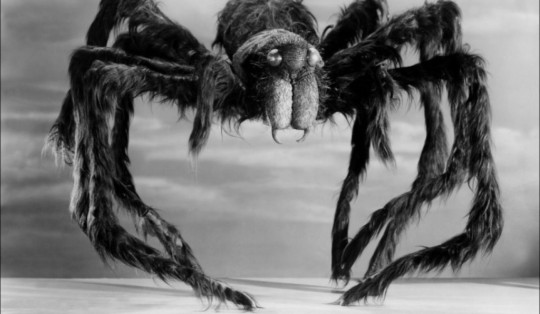
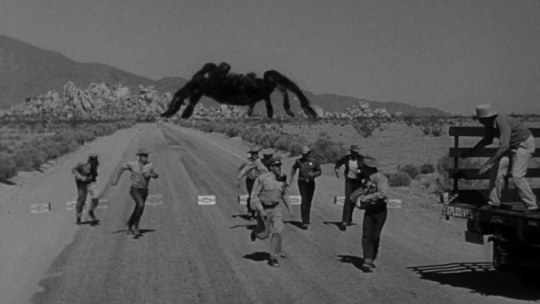

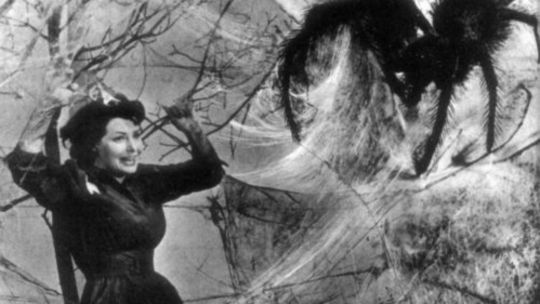



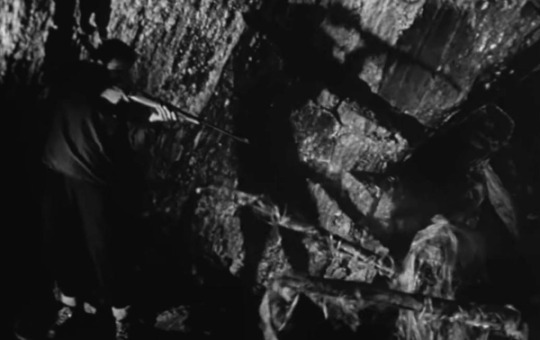
Giant Spider horror films of the 1950's
We gotta take out that eight-legged bastard!
But Colonel, where are we going to find a glass big enough to cover it?
Fury of the Congo (1951) Cat-Women of the Moon (1953) Mesa of Lost Women (1953) Tarantula (1955) World Without End (1956) Cosmic Monsters/The Strange World of Planet X (1957) The Cyclops (1957) Earth vs. the Spider (1958) Missile to the Moon (1958) Beast from Haunted Cave (1959)
11 notes
·
View notes
